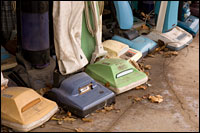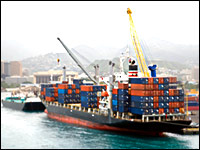pollution and waste
-
Debate: Roberts v. ‘clean coal’ flack Joe Lucas
In early April, the excellent investigative journalism show NOW on PBS ran an episode called “Can Coal be Earth-Friendly?“ In conjunction with the episode, NOW hosted an online debate between me and Joe Lucas, spokesflack for the American Coalition for Clean Coal Electricity (ACCCE). We were given a series of five questions. We each answered […]
-
The myth of the universal market … debunked!
Communication among economists, other social scientists, natural scientists, and lawyers is far from perfect. When the topic is the environment, discourse across disciplines is both important and difficult. Economists themselves have likely contributed to some misunderstandings about how they think about the environment, perhaps through enthusiasm for market solutions, perhaps by neglecting to make explicit all of the necessary qualifications, and perhaps simply by the use of technical jargon.
So it shouldn't come as a surprise that there are several prevalent and very striking myths about how economists think about the environment. Because of this, my colleague Don Fullerton, a professor of economics at the University of Illinois, and I posed the following question in an article in Nature: how do economists really think about the environment? In this and several succeeding postings, I'm going to answer this question, by examining several of the most prevalent myths.
One myth is that economists believe that the market solves all problems. Indeed, the "first theorem of welfare economics" states that private markets are perfectly efficient on their own, with no interference from government, so long as certain conditions are met. This theorem, easily proven, is exceptionally powerful, because it means that no one needs to tell producers of goods and services what to sell to which consumers. Instead, self-interested producers and self-interested consumers meet in the marketplace, engage in trade, and thereby achieve the greatest good for the greatest number, as if "guided by an invisible hand," as Adam Smith wrote in 1776 in The Wealth of Nations. This notion of maximum general welfare is what economists mean by the "efficiency" of competitive markets.
-
CO2 and the Clean Air Act
We are rapidly approaching national greenhouse gas legislation, either through a congressionally-led cap-and-trade bill or an EPA-led amendment to the Clean Air Act. However passed, these regulations will then immediately face a practical problem: how do you enforce a law that is in conflict with itself?
This problem arises because of the Clean Air Act's core failing: It compels businesses to increase their CO2 emissions. The moment we compel businesses to reduce those same emissions is the moment we expose this flaw and invite waves of litigation that will not only delay the implementation of CO2 policy, but also invite compromise and negotiation that will likely be forced to sacrifice some of the Act's environmental intent. How on earth did we get here? And what are we to do about it?
The clean air act mandates greenhouse gas pollution
Broadly characterized, the Clean Air Act does three things:
- It sets limits on the concentration of regulated pollutants at regulated point sources;
- It steadily tightens those limits over time, and;
- It requires any new pollution sources to meet the most current (stringent) pollution standards.
By any measure, the act has done a commendable job of reducing non-CO2 air pollution. But it has unwittingly increased CO2 pollution as well.
-
Umbra on fireworks
Dear Umbra, Our family has always lit a fair amount of fireworks for our 4th of July celebration. I would like to encourage my family and friends to find other ways to celebrate due to the CO2 emissions that will result. However, I don’t really know how much carbon is emitted. I already have to […]
-
New report says federal cleanup program wasting away
Image reprinted with permission from the Center for Public Integrity. A drop-off in both government action and funding has all but stopped the push to clean up America’s most toxic sites, posing health and environmental threats all over the country, according to a comprehensive series of reports released last week by the Center for Public […]
-
Made to Break reveals the roots of our throwaway culture
What could be more American than reaching for something new? The U.S. is, after all, a nation founded on the rejection of tradition and a profound belief in invention. This urge has given us more than two centuries of powerful technology, but has also made Americans the world’s most voracious consumers. The propensity to buy, […]
-
How companies are driving down the impacts of shipping
We all know that planes, trains, and automobiles use gobs of fuel and spew mega-gobs of greenhouse gases and other pollutants into the atmosphere — and that makes freight transport a particularly dirty business. Your new iPod is in there somewhere. Photo: iStockphoto. The environmental impacts of shipping goods hither and yon are significant but […]
-
Facts and figures on air quality and Latino health in the U.S.
92 — percentage of the U.S. Latino population living in urban areas in 20002, 3 80 — percentage of Latinos living in counties that violated at least one federal air-pollution standard in 20022 57 — percentage of non-Latino whites living in counties that violate at least one federal air-pollution standard in 20022 50 — percentage […]
-
Critics question World Bank’s role as carbon trader, fossil-fuel funder
For as long as it’s been around, the World Bank has been prone to mission creep. Established 60 years ago to rebuild war-torn Europe, it morphed into an institution whose raison d’etre was to help developing countries advance, then refined its focus on poverty alleviation and sustainable development in the 1980s and ’90s. During that […]



